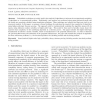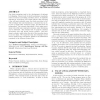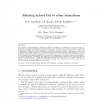1948 search results - page 66 / 390 » Formalizing Mirror Theory |
CSFW
2010
IEEE
14 years 1 months ago
2010
IEEE
—Zero-knowledge proofs have a vast applicability in the domain of cryptography, stemming from the fact that they can be used to force potentially malicious parties to abide by th...
JCST
2010
13 years 4 months ago
2010
Probabilistic techniques are widely used in the analysis of algorithms to estimate the computational complexity of algorithms or a computational problem. Traditionally, such analys...
ICSE
2008
IEEE-ACM
14 years 10 months ago
2008
IEEE-ACM
One time-consuming task in the development of software is debugging. Recent work in fault localization crosschecks traces of correct and failing execution traces, it implicitly se...
APSEC
2000
IEEE
14 years 2 months ago
2000
IEEE
It has been recognised that formal methods are useful as a modelling tool in requirements engineering. Specification languages such as Z permit the precise and unambiguous modell...
ENTCS
2007
13 years 10 months ago
2007
The hybrid χ (Chi) formalism is suited to modeling, simulation and verification of hybrid systems. It integrates concepts from dynamics and control theory with concepts from com...



